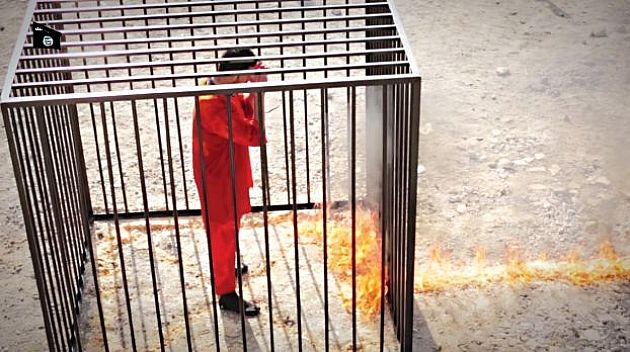Jordan Seeks Revenge on ISIS

Images of the burning of the Jordanian pilot shocked the political and non-political circles of the region. There were talks of his exchange with a female Iraqi terrorist who has been in prison in Jordan since 2005. The question is, why was there no exchange and why did the crisis become violent? Jordanian security officials had found out that the pilot had probably been executed on January 3rd, thus, they insisted on the exchange in order to make ISIS confess to its crime.
But what is ISIS’ objective behind this measure? It seems that their primary objective is to spread fear among the countries of the region. In fact, their message to the Arab countries of the region is to dissuade them from cooperating with the coalition and prevent them from sending troops to fight against ISIS. Of course, ISIS also attempts to instigate Jordanians to protest against their government, which has sent its air force to help the coalition, and create domestic crisis for Jordan. It should be mentioned that there are two opposing views with regard to this country’s cooperation with the US anti-terrorist coalition. Some people and some of Jordan’s parliamentarians oppose the presence of Jordan’s military forces alongside the US coalition against ISIS and there are protests in Amman and the city of Karak which is the hometown of the killed pilot. These protesters believe that Jordan must not get involved in the coalition’s fight against ISIS and its involvement will motivate the Salafi movement inside Jordan which supports ISIS. Therefore, they demand that Jordan’s military forces leave the coalition. On the other hand, some others and the political movements which are affiliated to the government state that ISIS is a terrorist phenomenon which has targeted the entire region and sooner or later will enter Jordan, hence, they must cooperate with the coalition against it. Many Jordanians oppose any foreign intervention particularly by the West and the US in the developments of the region. This group believes that the existing radicalism and terrorism are caused by such interventions. They consider the formation of ISIS and the capture of the pilot and his burning as the direct result of the US intervention in the developments of Iraq and Syria.
Nonetheless, following the death of the young pilot, the King of Jordan stopped his visit to Washington and returned to his country. The positions taken by the government of Jordan regarding this incident are very harsh and intimidating. As mentioned before, this country is faced with internal pressure and is bound to take certain measures in response to the burning of the pilot in order to reduce the tension in the public opinion, especially in response to the pressures which are exerted by the tribes of the south. These groups are traditional supporters of Jordan’s King. It is not clear whether Jordan would respond militarily or not. It seems that the military and security forces of Jordan have to enter a new phase in their fight against ISIS. They might increase their air strikes against ISIS strongholds in Iraq or raise the power to fight against terrorism in Iraq and Syria through training special security and operational forces, further cooperation with the West and even the possible intervention of some operational forces for mid-term immediate measures.

